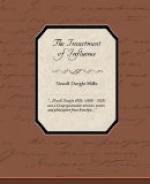A STUDY OF THE INFLUENCE OF LITTLE THINGS.
“We treat God with irreverence by banishing Him from our thoughts, not by referring to His will on slight occasions. His is not the finite authority or intelligence which cannot be troubled with small things. There is nothing so small but that we may honor God by asking His guidance of it, or insult Him by taking it into our own hands; and what is true of Deity is equally true of His Revelation. We use it most reverently when most habitually; our insolence is in ever acting without reference to it, our true honoring of it is in its universal application. I have been blamed for the familiar introduction of its sacred words. I am grieved to have given pain by so doing, but my excuse must be my wish that those words were made the ground of every argument and the test of every action. We have them not often enough on our lips, nor deeply enough in our memories, nor loyally enough in our lives. The snow, the vapour and the strong wind fulfil His word. Are our acts and thoughts lighter and wilder than these, that we should forget it?”—Ruskin.
“I expect to pass through this life but once. If there is any kindness or any good thing I can do to my fellow-beings let me do it now. I shall pass this way but once.”—–William Penn.
CHAPTER X.
THE THUNDER OF SILENT FIDELITY:
A STUDY OF THE INFLUENCE OF LITTLE THINGS.
Schliemann, uncovering marbles upon which Phidias and his followers carved out immortality for themselves, has not wrought more effectually for the increase of knowledge than have those excavators in Egypt who have uncovered the Rosetta stone, with other manuscripts of brick and marble. Of all these instructive tablets and tombs, none are more interesting than one picturing forth a national festival in the Jewish capital. Upon his canvas of stone the unknown artist portrays for us Herod’s temple with its outer courts and columns and its massive walls.
We see the public square crowded with merchants and traders, who have come in from the great cities of the world to this festival of the fathers. With solemn pageantry, these Jews, who were the bankers and merchants of that far-off age, march through the streets toward the gate that is called Beautiful. In the vast parade are men notable by their princely wealth in Ephesus and Antioch, in Alexandria and Rome. We see one advancing with his retinue of servants, another with the train which corresponds to his wealth. One group the artist exhibits as characteristic. Advancing before their lord and master are four servants, who lift up in the presence of admiring spectators a platter upon which lies a heap of shining gold. The murmur of admiration that runs through the crowd is sweeter to the old merchant’s ear than any music of harp or human voice. Passing by the treasury, what gifts are cast upon the resounding table! How heavy the bars of gold! What silver plate! What pearls and jewels! How rich the fabrics and hangings for the temple! As at St. Peter in the sixteenth century, so in Christ’s day it seemed as if the whole world were being swept for treasures for enriching this glorious temple.




